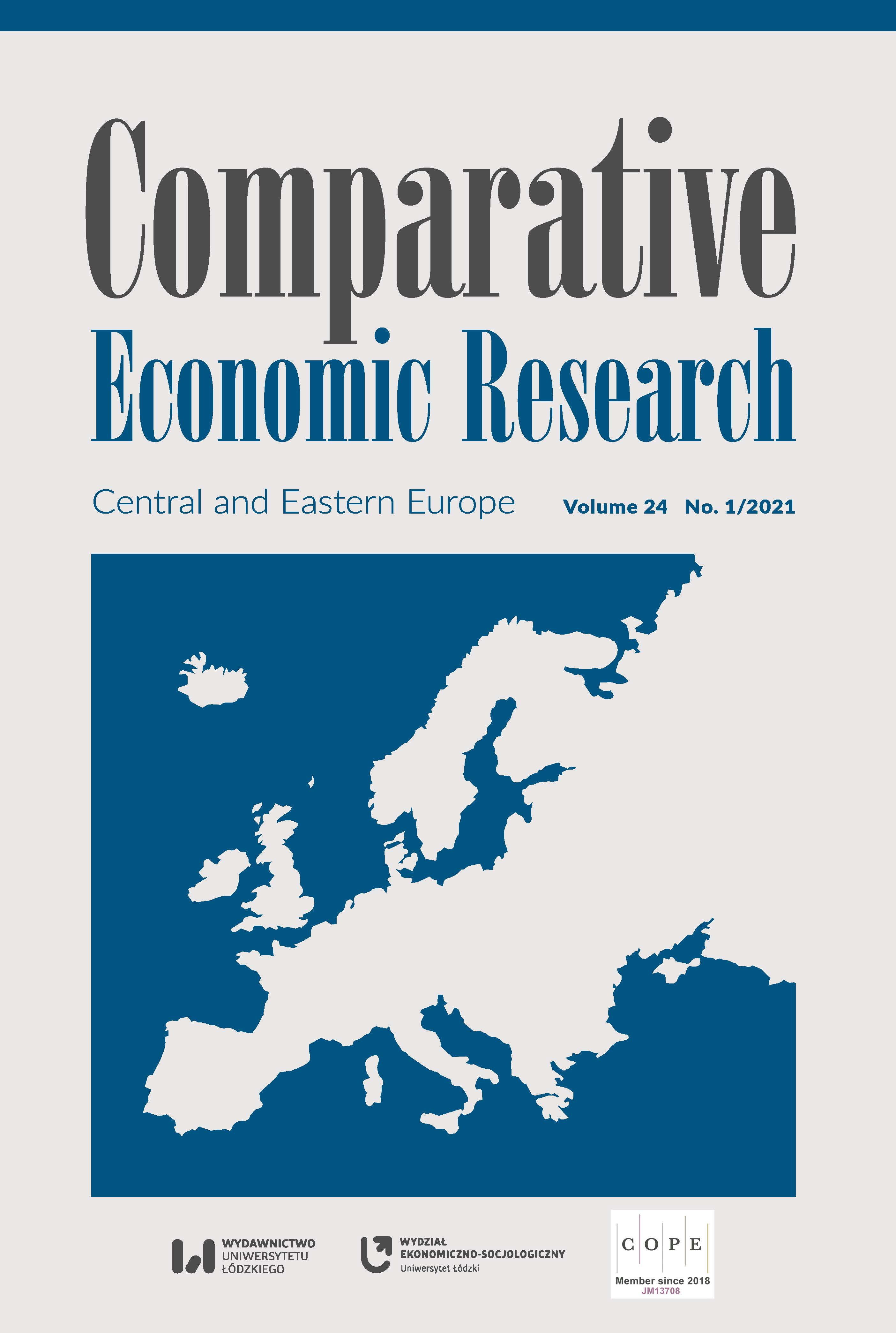The Development of Corporate Social Responsibility in the Context of Overcoming a Welfare State Crisis: a Theoretical and Empirical Analysis
DOI:
https://doi.org/10.18778/1508-2008.24.07Keywords:
welfare state, social crisis, social policy, social protection, corporate social responsibilityAbstract
The current social crisis, caused by the negative consequences of globalization, labor migration, and an aging population, requires the state’s role in economic and social spheres to be reconsidered. In order to achieve and maintain sustainable economic growth, the pressing social problems, such as poverty, hunger, discrimination, and the unequal distribution of income, should be solved. Under these circumstances, the paper investigates the process of forming a welfare state to evaluate the role of current states in this period of social crisis. To achieve the aim, the following methods were used: historical and systematic analysis of the scientific literature and socio-economic conditions of the evolution of theoretical approaches of the welfare state, and the causes and characteristics of the present social crisis; cluster analysis of European countries to find similar patterns based on the level of corporate social responsibility (CSR) development, state social expenditures, and the government budget balance. The paper contains a detailed analysis and discussion of the formation of a welfare state. The study concludes that the process of delegating some state social services to the private sector in the form of CSR can be considered an efficient mechanism to eliminate and overcome the current social crisis through the accumulation of social capital. At the same time, the results of the cluster analysis of European countries demonstrated the importance of CSR development as a compensator for the negative effects of a public welfare crisis and for solving pressing social problems in most European countries. Specific features of post-socialist countries in the context of social orientation of state policy and the development of CSR are highlighted.
Downloads
References
Aravacik, E.D. (2018), Social Policy and the Welfare State, IntechOpen, London, https://www.intechopen.com/books/public-economics-and-finance/social-policy-and-the-welfare-state (accessed: 24.02.2020).
Google Scholar
Bazylevych, V.D., Grazhevska, N.I., Mostepaniuk, A.V., Virchenko, V.V. (2019), Accumulation of social capital as a positive externality of corporate social responsibility development in transition economies, “Scientific Bulletin of National Mining University”, 1, pp. 132–140, https://doi.org/10.29202/nvngu/2019-1/19
Google Scholar
DOI: https://doi.org/10.29202/nvngu/2019-1/19
Brien, S., Flanagan, S., Herring, D., Irving, H., Lee, J., McFahn, M., Pilsbury, S., Wickstead, E. (2019), The Legatum Prosperity Index 2019, https://www.prosperity.com/download_file/view_inline/3690 (accessed: 24.02.2020).
Google Scholar
Carroll, A.B. (1979), A three-dimensional conceptual model of corporate performance, “Academy of Management Review”, 4 (4), pp. 497–505, https://doi.org/10.2307/257850
Google Scholar
DOI: https://doi.org/10.5465/amr.1979.4498296
Chapman, B. (2007), The Police State, “Government and Opposition”, 3 (4), pp. 428–440, https://doi.org/10.1111/j.1477-7053.1968.tb01341.x
Google Scholar
DOI: https://doi.org/10.1111/j.1477-7053.1968.tb01341.x
Esping-Andersen, G. (1990), The Three Worlds of Welfare Capitalism, Princeton University Press, Princeton, https://doi.org/10.1177/095892879100100108
Google Scholar
DOI: https://doi.org/10.1177/095892879100100108
Eurostat (2020), Asylum and first time asylum applicants by citizenship, age and sex Annual aggregated data (rounded), https://appsso.eurostat.ec.europa.eu/nui/show.do?dataset=migr_asyappctza&lang=en (accessed: 24.02.2020).
Google Scholar
Geissler, H. (1980), Sozialstaat. Kampf um Worter?, Politische Begriffe im Meinungsstreit, Wien.
Google Scholar
Golovashchenko, O.S. (2016), The Social Law State and the challenges of globalization, “State Building and Local Government”, 32, pp. 3–11.
Google Scholar
Gordon, C. (1991), The Foucault Effect: Studies in Governmentality, University of Chicago Press, Chicago, https://laelectrodomestica.files.wordpress.com/2014/07/the-foucault-effect-studies-in-governmentality.pdf (accessed: 24.02.2020).
Google Scholar
Hodali, D., Prange, A. (2018), Asylum benefits in the EU: How member states compare, “Deutsche Welle”, https://www.dw.com/en/asylum-benefits-in-the-eu-how-member-states-compare/a-44298599 (accessed: 24.02.2020).
Google Scholar
Keynes, J.M. (1936), The General Theory of Employment, Interest, and Money, Palgrave Macmillan, London, https://www.hetwebsite.net/het/texts/keynes/gt/gtcont.htm (accessed: 8.02.2021).
Google Scholar
Кhoma, N. (2014), Welfare state of the third millennium: upgraded models, “Scientific Notes of IPENR”, 3 (71), pp. 205–215.
Google Scholar
Kolev, S., Goldschmidt, N., Hesse, J.-O. (2014), Walter Eucken’s role in the early history of the Mont Pèlerin Societ, https://www.econstor.eu/bitstream/10419/90809/1/77707169X.pdf (accessed: 20.02.2020).
Google Scholar
Mauro, P., Romeu, R., Binder, A., Zaman, A. (2013), A Modern History of Fiscal Prudence and Profligacy, IMF Working Paper, https://doi.org/10.5089/9781616357825.001
Google Scholar
DOI: https://doi.org/10.2139/ssrn.2226278
Middleton, R. (1996), Government versus the Market: The Growth of the Public Sector, Economic Management and British economic performance, Edward Elgar, Cheltenham.
Google Scholar
Mikołajek-Gocejna, M. (2018), The Environmental, Social and Governance Aspects of Social Responsibility Indices – A Comparative Analysis of European SRI Indices, “Comparative Economic Research. Central and Eastern Europe”, 21 (3), pp. 25–44, https://doi.org/10.2478/cer-2018-0017
Google Scholar
DOI: https://doi.org/10.2478/cer-2018-0017
Niskanen, W.A. (1988), Reaganomics, https://www.econlib.org/library/Enc1/Reaganomics.html (accessed: 24.02.2020).
Google Scholar
OECD Data (n.d.), https://data.oecd.org (accessed: 24.02.2020).
Google Scholar
Piasecki, R., Gudowski, J. (2017), Corporate Social Responsibility: the Challenges and Constraints, “Comparative Economic Research. Central and Eastern Europe”, 20 (4), pp. 143–157, https://doi.org/10.1515/cer-2017-0032
Google Scholar
DOI: https://doi.org/10.1515/cer-2017-0032
Rooks, T. (2019), Can Germany’s social market economy system cope with another 70 years?, “Deutsche Welle”, https://www.dw.com/en/can-germanys-social-market-economy-system-cope-with-another-70-years/a-50490937 (accessed: 24.02.2020).
Google Scholar
Smiley, G. (n.d.), Great Depression, https://www.econlib.org/library/Enc/GreatDepression.html (accessed: 24.02.2020).
Google Scholar
The World Bank Open Data (2020), https://data.worldbank.org/ (accessed: 24.02.2020).
Google Scholar
United Nations (2015), Transforming our world: the 2030 Agenda for Sustainable Development, https://sustainabledevelopment.un.org/post2015/transformingourworld (accessed: 24.02.2020).
Google Scholar
Urquhart, M.A., Hewson, M.A. (1983), Unemployment continued to rise in 1982 as recession deepened, https://stats.bls.gov/opub/mlr/1983/02/art1full.pdf (accessed: 24.02.2020).
Google Scholar
Volker, R.B. (2015), Ordoliberalism, Ludwig Erhard, and West Germany’s “Economic Basic Law”, “European Review of International Studies”, 2 (3), pp. 37–47, https://www.jstor.org/stable/26593477?seq=1 (accessed: 8.02.2021)
Google Scholar
DOI: https://doi.org/10.3224/eris.v2i3.23447
Zadoia, A., Palladin, A. (2017), Essay on the welfare State Models, “Scientific Bulletin of the Diplomatic Academy of Ukraine”, 24 (3), pp. 14–18, http://ir.duan.edu.ua/bitstream/123456789/221/1/Nvdau_2017_24%283%29__4.pdf (accessed: 24.02.2020).
Google Scholar
Zarnowitz, V., Moore, G.H. (1977), The Recession and Recovery of 1973–1976, “Explorations in Economic Research”, 4 (4), pp. 471–557, https://www.nber.org/chapters/c9101.pdf (accessed: 24.02.2020).
Google Scholar
Downloads
Published
How to Cite
Issue
Section
License

This work is licensed under a Creative Commons Attribution-NonCommercial-NoDerivatives 4.0 International License.











